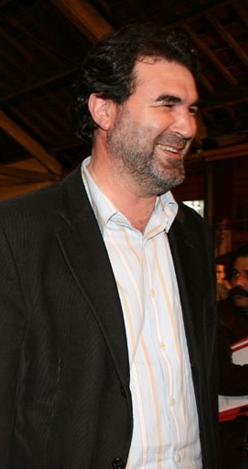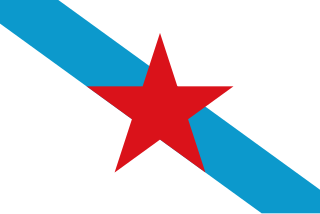
The Galician Nationalist Bloc is a political alliance of left-wing Galician nationalist parties. It is self-defined as a "patriotic front".

Anxo Manuel Quintana González, commonly known as Anxo Quintana, is the former leader of the Galician Nationalist Bloc, the main nationalist party in Galicia. From 2005 to 2009 he was a partner in the Galician Government, holding the positions of Vice-President and Minister for Social Affairs.
Galician Workers' Party was a political party in Galicia, Spain.
The Galician People's Union is a Galician nationalist and communist political party, and is one of the registered political parties of Spain. The party publishes the magazine Terra e Tempo, and the secretary general is Néstor Rego.

The Galician People's Party was a Galician political party in the first years of the Spanish democracy.

Galicianism is a regionalist political movement in Galicia.

Galician nationalism is a form of nationalism found mostly in Galicia, which asserts that Galicians are a nation and that promotes the cultural unity of Galicians. The political movement referred to as modern Galician nationalism was born at the beginning of the twentieth century from the idea of Galicianism.

Xosé Manuel Hixinio Beiras Torrado is a Galician politician, economist, writer and intellectual. He is professor of Structural Economy at the Faculty of Economic Sciences of the University of Santiago de Compostela. He is a former member of the National Council of the Galician Nationalist Bloc, he is currently the leader of Renewal–Nationalist Brotherhood, an independentist political party. He formerly had representation in the Galician parliament.

Renewal–Nationalist Brotherhood is a political party in Galicia. Formed in 2012, under the guidance of historical leader Xosé Manuel Beiras, Anova was formed by Encontro Irmandiño, the FPG, Movemento pola Base, the Galician Workers Front and independent militants. Anova defines itself as a Galician nationalist, socialist, feminist, Galician independentist, ecologist, internationalist organization. Its internal organization is run by assemblies.

The National Inter-Union of the Galician Workers was a Galician union with an anticapiltalist, leftist and Galician nationalist ideology, direct heir of the Intersindical Nacional Galega (ING), and precursor of Confederación Intersindical Galega (CIG).
The Galician National-Popular Assembly was suprapartisan umbrella organization established in 1975 created to coordinate various political fronts of the left-wing Galician nationalist movement.

The Galician National-Popular Bloc was a Galician electoral candidacy. It had as the national sovereignty for Galiza as its main objective and as an alternative to autonomism. It was formed by the Galician People's Union (UPG) and Galician National-Popular Assembly (ANPG).

Commitment to Galicia is a Galician political party with a Galician nationalist, progressive ideology.

The Galician Nationalist Party–Galicianist Party is a Galician nationalist and liberal political party, coming from a split of the Galician Coalition. The PNG–PG had 132 members in 2002. Xosé Mosquera Casero is its secretary general, after the VIII Congress in September 2011.

Encontro Irmandiño is a political organization that is part of Anova-Nationalist Brotherhood in Galicia, Spain. It used to be an internal current in the Galician Nationalist Bloc (BNG). EI was founded in 2007 and has an ideology based in Galician nationalism, direct democracy, anticapitalism, feminism and alter-globalization.
Galician Socialist Space is a Galician political party integrated in Máis Galiza and Compromiso por Galicia.
The Socialist Collective was a Galician political organization that was part of the Galician Nationalist Bloc (BNG).
The Asociación para a Defensa Ecolóxica de Galiza is a Galician ecological group founded in 1974 and registered in 1976. ADEGA has always been linked with the Galician nationalist movement. The organization has chapters in the comarcas of A Mariña, Santiago, Coruña, Costa da Morte, Lugo, O Carballiño, Ourense, A Paradanta, Barbanza, Ordes, A Ulloa, Pontevedra, Trasancos, and Vigo.
Communist Movement of Galicia was a communist political party created in Galicia during the last years of the dictatorship of Franco as the Galician section of the Communist Movement, although in practice the MCG acted as an independent party. The leaders of the MCG were Xesús Veiga Buxán and Carmen Santos Castroviejo. Unlike other sections of Spanish left-wing political parties, the MCG was close to the Galician nationalist movement and supported self-determination and national sovereignty for Galicia.












